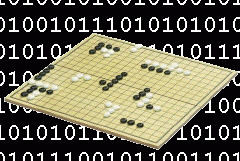Supercomputer beats human at "Go", celebrates with a Tsingtao
 When they’re not playing the perfect game of draughts or proving they can solve the Rubik’s Cube more efficiently than you, I’ve heard that supercomputers like nothing better than a salubrious game of “Go”.
When they’re not playing the perfect game of draughts or proving they can solve the Rubik’s Cube more efficiently than you, I’ve heard that supercomputers like nothing better than a salubrious game of “Go”.
As much as anything, they enjoy the irony of playing a game that’s eons older than they are.
So, it turns out some of them are quite good, like “Huygens”, the Dutch National Supercomputer. It beat Kim MyungWan, a “human Go professional”, even showing off by having a nine stone handicap (no, not in weight, obviously).
Admittedly, Huygens is an IBM Power 575 Hydro-Cluster system which can work at a peak speed of 60 trillion calculations per second, so it should be pretty good.
Now, “Go” confuses the hell out of me, as a read of the rules proves. As far as I’m concerned, it’s complicated enough to warrant a computer helping out. I’m hiring Huygens, if it’s not too intoxicated following the celebratory quaffing of several pints of Chinese beer, that is.
Related posts: Computer was once BBQ | Dell Studio Hybrid PC
Discover more from Tech Digest
Subscribe to get the latest posts sent to your email.


12 comments
Woww its very proficient site.
As far as I’m aware, from the only respectful bit of your comment, the human had the nine stone advantage, though I’m aware that the reports are ambiguous.
So beautiful sharing , thank you !
I think you need a bit more of a story with this as this isn’t really a news story in its current form. Perhaps you could write about why you like Michael so much
It is hard to say such a thing is clear.
Significant change, it is.
Looks like a bit of a sensayuma failure all round…I personally found the story interesting, anyway, and the responses were a bit ticklish, too 😉
Thanks Wolfmeister, I think… 🙂
To be clear, Myungwan Kim gave the computer a 9-stone handicap, so the computer had the advantage.
http://www.usgo.org/index.php?%23_id=4602
Hmm, OK, so not quite as impressive after all.
Thanks for picking up on the real aspect of the story, though.
Hey, you want your story to be taken seriously, don’t attribute beer-drinking to a computer in the title.
As far as your “knowing nothing of the game,” we all realized that. Go is actually a very simple game — to explain. Its very simple rules of play have the interesting effect of producing fiendishly complex execution strategies.
I’ve been trying to track down more information, and it’s making me crazy; all the reports are ambiguous about who had the 9-stone handicap, the human or the computer. In other words, did the human start with a huge advantage, or did the computer?
OK, it was all meant to be humorous. I didn’t say I wanted the story to be taken seriously, I was merely saying that the main point of the article was not how the “Go” board in the picture had been set up.
“We all realised that”. Thanks for speaking for all of TD’s readers.
And as for using a reference to a computer / robot drinking beer — again, meant to be humorous. Works in Futurama (and no, I’m not saying I’m as good a writer as Groening, before you troll me on that one).
As far as I’m aware, from the only respectful bit of your comment, the human had the nine stone advantage, though I’m aware that the reports are ambiguous.
Thanks for stopping by, anyway.
It might have been nice to have a real Go game in the picture illustrating the article, instead of a board with a few stones placed on it by someone who knows nothing of the game.
Just so you know, I didn’t set this board up myself (even though I know “nothing of the game”, though that was supposed to be humorous – sorry you missed it).
If you want to have a go at the company that set up the board in the first place, try Philos.
Thanks for picking up on the real aspect of the story, though. :]
Comments are closed.